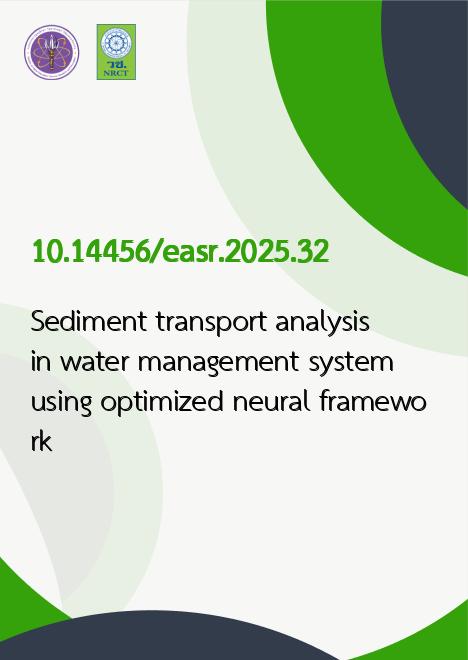
|
Sediment transport analysis in water management system using optimized neural framework |
|---|---|
| รหัสดีโอไอ | |
| Creator | 1. Minaxi Rai Sharma 2. Mahesh Waghmare 3. Bharati Vikram Mahajan 4. Rajkuwar Dubal 5. Preeti Gajghate 6. Anandrao R. Deshmukh |
| Title | Sediment transport analysis in water management system using optimized neural framework |
| Publisher | Faculty of Engineering, Khon Kaen University |
| Publication Year | 2568 |
| Journal Title | Engineering and Applied Science Research |
| Journal Vol. | 52 |
| Journal No. | 4 |
| Page no. | 364-374 |
| Keyword | Deep neural network, Transported sediment load, Water management system, Hyena optimization, Sediment load prediction |
| URL Website | https://ph01.tci-thaijo.org/index.php/easr/index |
| Website title | Engineering and Applied Science Research |
| ISSN | 2539-6161 |
| Abstract | In a water management system, sediment prediction is considered a complex process. Conventional sediment prediction techniques are less precise. The sediment predictions through artificial intelligence analysis possess more prediction characteristics than the conventional approaches. One of the divisions of artificial intelligence is the deep learning technique. In this investigation, the deep learning technique is combined with the neural network approach for predicting the sediment parameters of the water management system using a novel Hyena Deep Neural Sediment Framework (HDNSF). Prime contributions are initially, the parameter of the water management system is provided as input to the approach, then the shear stress and transportation stage of the sediments are determined and the outcomes are generated. Thereafter, the mean velocity of the sediment particles, total sediment load, and the rate of total transported sediment are determined for the river system. The outcomes of the water management system are predicted to consist of transported sediment load and rate of transported sediments. Along with that, the determination coefficient of the prediction system is also evaluated. The outcomes of the prediction system and the determination coefficient of the prediction system are compared with recent studies such as Ant Colony Optimization Fuzzy Inference System (ACOFIS), Adaptive Neuro-Fuzzy Inference System (ANFIS), Least Square Support Vector Machine (LS-SVM), and Group Method of Data Handling (GMDH). A plain river water management system is analyzed, including its characteristics. At the end of fifth month, peak sediment load transport and sediment rate was recorded. The peak sediment load was 124695 tons/day and the peak sediment transport rate was 19636m3/s. The coefficient of determination of the proposed HDNSF technique is 0.982. |